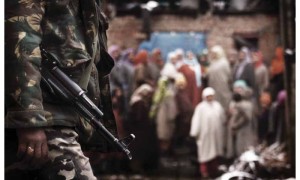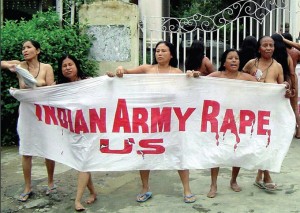In this blog post, Sunidhi, a student of the Rajiv Gandhi National University of Law, Patiala writes about Armed Forces Special Powers Act (AFSPA), 1958. The blog post compares AFSPA with law prevalent in the rest of India and the atrocities faced by people due to this Act.
The Armed Forces Special Powers Act (AFSPA), 1958 owes its inception to the Britishers. It was first enforced in 1942 by the Britishers to suppress the Quit India Movement. AFSPA, 1958 was originally enforceable in Assam and Manipur only but with an increase in terrorist activities in that region, the Act was expanded to all the Seven Sisters.
The AFSPA has conferred special powers on Indian Armed Forces in North-East India (disturbed area). A similar Act was passed in Jammu & Kashmir in 1990, and it is still in force. If in any State or Union territory of India, the Governor of the State or the Administrator of the Union Territory or Central Government is of the opinion that the whole or any part of the State or Union Territory is in a dangerous or disturbed situation, then that area can be declared as ‘disturbed area’ and AFSPA can be imposed in that region.
This Act empowers Indian Armed Forces to shoot, arrest or search any person and to destroy any place where laws are being violated, or the officer believes that the laws are being violated. No prosecution will lie against that officer who has taken such an act in North-East India under this Act except with the previous sanction of the Central Government. This Act is criticized by many because it curbs the fundamental rights of the citizens as well as others. It also violates the human rights of an individual.
No prosecution since its inception
The Act was passed 58 years ago in 1958 with only seven sections. Still, it is one of the most brutal and inhuman legislation. Section 4 and 6 give immense power to the army officers to destroy anyone’s life. Section 4 gives the power to kill or arrest the suspect and destroy any dangerous place. Section 6 rescues officers from criminal prosecution if any action is taken under this Act. Numerous people have been killed, raped, and their properties have been destroyed under the garb of this Act. But till date no officer has been punished for committing violence against civilians. In 1960s, many villages were burnt down by army officials in Nagaland and Mizoram but no one has been punished for such cruelty till date. No effort has been made to rehabilitate all those villagers who were forced to leave their homes and their property at gunpoint. This horrible history is less known to Indians.
Violation of human rights and fundamental rights of victims
Article 3 of The Universal Declaration of Human Rights, 1948 declares that everybody has the right to life, liberty, and security of person. Article 14 of the Indian Constitution guarantees equality before the law. Article 21 guarantees the right to life and personal liberty not only to citizens but everyone. And many more provisions of the law de jure (according to law) protect rights of everyone. But in reality, what happens is that the houses of civilians are destroyed, and they are herded together at common sites where they spend a very miserable life. A life without even the basic necessities. Hence, the words of law remain enforceable on paper only.
AFSPA v. Domestic law for rest of India
-
Power to arrest
Section 4 of AFSPA gives power to officers to arrest anyone, without a warrant, who has committed cognizable offense or is suspected to have committed a cognizable offense.
Section 41 of CRPC, states that police can arrest a person, without a warrant, if substantial proof is available against the suspect;the person is a proclaimed offender; or against whom a reasonable complaint has been made.
-
Power of search and seizure
Section 4 of AFSPA states that an officer can search a premise without a warrant only on his/her belief that the suspect has entered the premise.
Section 47 states that police can search a premise where he/she reasonably believes that the suspect has entered without a warrant.
-
Power to open fire even to the extent of causing death
Section 4 of AFSPA empowers officers to open fire to the extent of causing death if he/she believes that it is necessary to maintain peace and order.
Section 76 of IPC states that any act done by a person by mistake of fact and not by mistake of law which the person is bound to do by law is no offense. Section 100 states that if a person, to avoid death in private defense kills, someone is not offense, under some restrictions.
-
Immunity from legal consequences
Section 6 of AFSPA immunes army officers from persecution, suit or any other legal proceedings, except with the prior sanction of Central Government, for the acts committed under this act.
Section 197 of IPC states that neither Judges nor public servants can be prosecuted for an offense alleged to be committed while performing their services except with the prior sanction of the government.
Thus, it can be concluded that AFSPA has given too much of powers to army officers whereas the law for the rest of India has many safeguards to protect citizens from atrocities of officers.
Need to amend the law
AFSPA, 1958 has done more harm than the good it was supposed to do. It is high time that the act should be amended as the cruelties done by the officers are increasing due to unaccountability. The number of murders, rapes, and cases of violence is increasing day by day. Under the garb of AFSPA, the officers have committed numerous crimes and escaped punishment. The army personnel are trained for dealing with terrorists. They are not trained in how to deal with the civilians. As a result, the army personals mistreat the civilians. And the civilians have to face consequences of this ‘draconian law’.
There is an urgent need to amend the Act and make the officers accountable for the reckless killings, murders, and rape of innocent civilians. They should also be trained to deal with civilians in an appropriate way and should not treat the civilians as terrorists.
 Serato DJ Crack 2025Serato DJ PRO Crack
Serato DJ Crack 2025Serato DJ PRO Crack














 Allow notifications
Allow notifications



YOUR KNOWLEDGE IS ONE SIDED, AND BLINKERED NEED MORE STUDY BEFORE COMMENTING ON SENSITIVE ISSUES